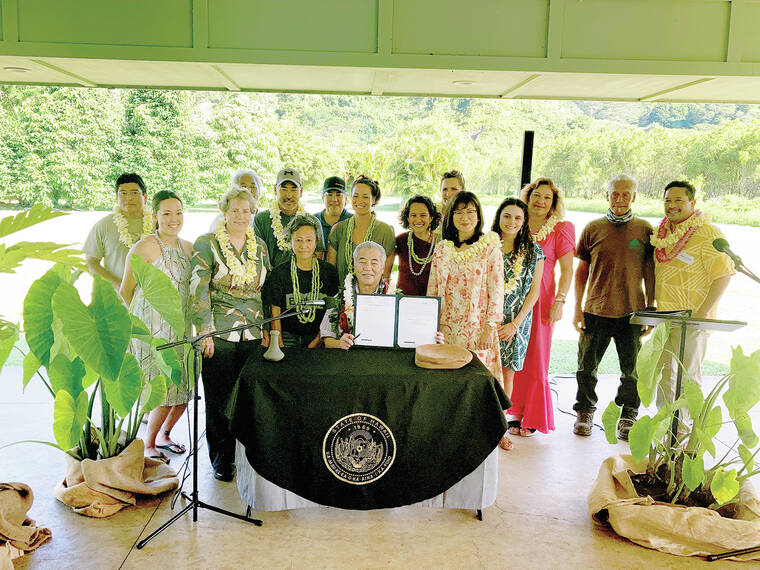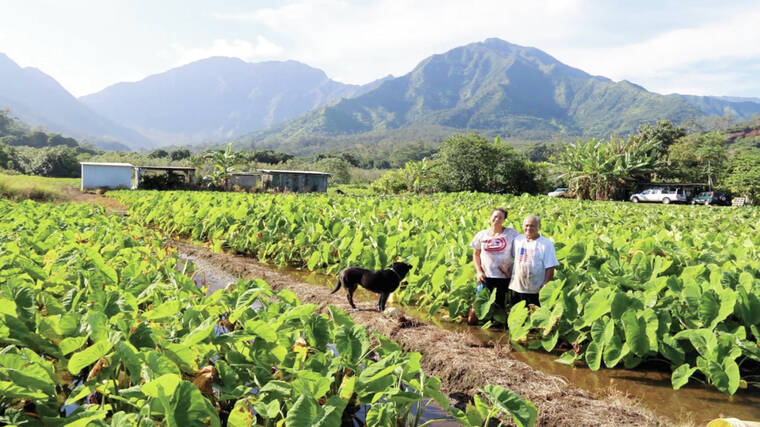WAIPA — North Shore taro farmers are celebrating a hard-earned victory, years after catastrophic flooding and subsequent legal hurdles upset their way of life.
Members of the Wai‘oli Valley Taro Hui watched as Gov. David Ige signed House Bill 1768 into law Wednesday, at Waipa outside Hanalei.
The bill, now Act 27, recognizes and protects their rights to water for traditional taro cultivation.
“It was a journey four years in the making,” Bobby Watari told The Garden Island. “It’s a beautiful day for us today, as taro farmers.”
The journey began in 2018, when historic flooding destroyed the farmers’ centuries-old ‘auwai (irrigation ditch system).
“My dad was 82 at the time,” Taro Hui secretary JoAnne Kaona said.
“He said, ‘It’s fine,’ but it was not fine. Everything was everywhere.”
Rural farmers are used to watershed maintenance and recovery after storm events.
But 2o18 was different, according to attorney and University of Hawai‘i law professor Kapua Sproat.
“The damage was so severe, that this was the first time they needed outside help,” Sproat said in a recent interview.
Kaua‘i County and state officials were among those who joined the disaster recovery efforts.
The work revealed the 15th-century irrigation system is in a modern-day conservation zone.
The discovery proved to be ironic, as the farmers found themselves facing an overwhelming legal process to acquire a water lease under state statute Chapter 171.
Multiple community members, including taro farmers, then-County Deputy Engineer Lyle Tabata and County Councilmember Mason Chock, contacted Sproat for assistance.
Sproat, who was born and raised in Kalihiwai, specializes in Native Hawaiian law, Indigenous rights and natural resource protection and management.
Her law students, with support from the Office of Hawaiian Affairs, collaborated with the Wai‘oli Valley Taro Hui in an effort to gain the required water lease.
The yearslong project, which involved over 30 law students logging more than 2,000 hours of work, found an ally in State Rep. David Tarnas of Hawai‘i Island, Chair of the Hawai‘i State House Committee on Water and Land.
Tarnas introduced H.B. 1768 this legislative session, after speaking with Kaua‘i’s North Shore taro community.
The now-law effectively exempts traditional taro cultivators from Chapter 171’s water-lease requirements.
Tarnas could not attend the bill-signing ceremony at Waipa. Politicians and officials who could – including Ige, Kaua‘i state Rep. Nadine Nakamura (North Shore, portions of Eastside) and Hawai‘i Department of Land and Natural Resources Chairperson Suzanne Case – expressed excitement.
“Kalo (taro) cultivation in Hawai‘i is a vital cultural practice that connects people with place, and honors the familial relationship Native Hawaiians have with kalo,” Ige said, while standing behind a podium surrounded by lush taro arrangements.
“The practice also supports local food production and provides important ecosystem services such as flood mitigation, sediment retention and many, many other benefits,” the governor continued.
Wednesday’s ceremony also included an original mele and hula performed by O‘ahu-based attorney U‘ilani Tanigawa Lum.
Tanigawa Lum, who met the Wai‘oli Valley Taro Hui while a law student, composed “Aia I Waioli ke Aloha ‘Aina” to commemorate the North Shore farmers and their relationship to the land.
(The song, recorded by singer Kainani Kahaunaele, can be found on the 2020 compilation album “Huliamahi Volume 1.”)
While the Wai‘oli Valley Taro Hui’s rights to streamwater have been secured, other challenges remain in the offing.
The farmers are still recovering from the 2018 floods and that year’s Hurricane Lane, according to Sproat.
But that’s to be expected, farmer Chris Kobayashi said.
“Today’s a good day. But there are always challenges,” she said, as folks slowly drifted from the Waipa celebration.
“We’re not a regular, nine-to-five job where everything’s set. One day, you could have a hurricane. One day, you could have a flood, like we did,” Kobayashi concluded. “We have no control over that, and so, we’ve just got to pick up and start again. I think that’s the resilience of generational farmers. We’re going to pick up and go again, even though something happens.”
•••
Scott Yunker, reporter, can be reached at 245-0437 or syunker@thegardenisland.com.







